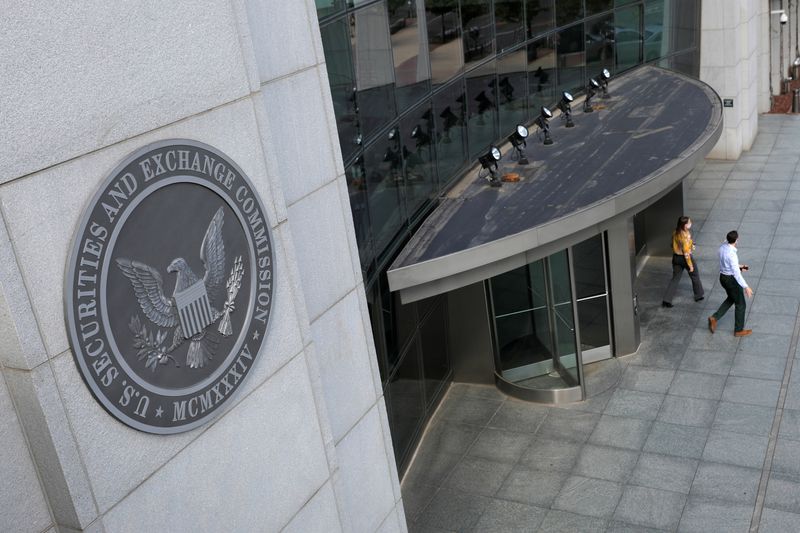By Douglas Gillison
(Reuters) -U.S. industry and other groups have sued to overturn rules adopted under Securities and Exchange Commission (SEC) Chair Gary Gensler, with knock-on implications for others on his agenda. Here’s a list of rules and actions affected, according to legal filings, the SEC’s agenda, and legal experts. * Nasdaq corporate board diversity: Conservative group theAlliance for Fair Board Recruitment sued the SEC in the FifthCircuit after the agency blessed a Nasdaq rule promotingdiversity on corporate boards. Gensler recently cited thislawsuit as the reason why he could not discuss progress on asimilar SEC planned rule. * Proxy voting: The Sixth Circuit Court of Appeals lastmonth sided with the SEC in a case brought by trade associationsincluding the U.S. Chamber of Commerce, finding the agency waswithin its rights to rescind Donald Trump-era regulations oncorporate elections. * Share buybacks: The Fifth Circuit in December 2023overturned a rule that required companies to disclose data onshare repurchases, finding that the SEC had not justified thecosts. * Private funds: Following a suit brought by the ManagedFunds Association (MFA) and other industry groups, the FifthCircuit in June struck down this rule requiring more privatefund disclosures. It found the SEC had exceeded its legalauthority in seeking to regulate the $27 trillion industry. * Short-sale disclosures: MFA and others are also suingthe SEC in the Fifth Circuit to overturn this rule boostingtransparency for “short” trades – bets stocks will fall. * Securities loan reporting: As part of the same suit, MFAand others are suing to overturn this rule requiring securitieslenders to report their loans, which the SEC said would alsoboost transparency of short bets. * Treasury market dealers: MFA and others are suing in theNorthern District of Texas to spike this requirement thatproprietary traders and other Treasury market players registeras broker-dealers and face stricter oversight. * Climate disclosures: Republican-led states and industrygroups pounced on this rule, bringing suits that wereconsolidated in the Court of Appeals for the Eighth Circuit.Pending the outcome, the SEC has stayed the rule, which requirescompanies to disclose certain carbon emissions as well asclimate risks and costs. The SEC is revising these proposals: * Swing pricing: This proposal aimed to discourage investors from cashingout of funds at times of market stress. The Chamber hadindicated it would sue if the SEC finalized the rule. * Investment adviser custody: This would extend existingcustody rules to crypto assets. Lawyers say its scope may needto be revised in light of the June private funds ruling. * AI: The SEC proposed requiring broker-dealers andinvestment advisers to “eliminate or neutralize” possibleconflicts of interest when using AI. The MFA and other groupshave called on the SEC to withdraw the proposal because it citesa statute the SEC had unsuccessfully relied on in asserting itsauthority to promulgate the private funds rule. * Cybersecurity and outsourcing: On the same basis, thegroups also called on the SEC to withdraw proposals requiringinvestment advisers to tighten cyber controls, and conduct duediligence before outsourcing some services. Several otherlawyers agree the private funds ruling has adverse implicationsfor these and the AI proposals. * Human Capital Management: Gensler said upon takingoffice in 2021 these updated rules on workforce data disclosure– such as turnover and diversity figures — would be among his”top priorities” but they have so far not made it to theproposal stage. The U.S. Chamber of Commerce earlier this yearthreatened to sue if the SEC proposed the rule. Gensler toldreporters last month he needs more data before proceeding with aproposal.
Supreme Court challenges: * SEC v Jarkesy: The Supreme Court in June held that theConstitution forbade the SEC from seeking fraud penalties beforethe SEC’s internal administrative law court rather than jurytrials. * Other Supreme Court rulings curtail the SEC and otheragencies’ room to maneuver: in 2022, the court said agenciescannot issue rules on “major questions” without expressauthority from Congress; in June, it invalidated a four-decadeprinciple granting deference to regulators’ interpretations ofambiguous statutes; and in July, the court substantiallybroadened the time period during which regulations can bechallenged in court.
Other notable litigation: * Consolidated Audit Trail: Citadel Securities and theAmerican Securities Association last year sued the SEC tochallenge a funding model for the Consolidated Audit Trailmarket surveillance system. * Grayscale: Siding with Republican commissioners over theobjections of fellow Democrats, Gensler in January approved U.S.bitcoin exchange-traded funds after an appeals court agreed witha challenge from crypto firm Grayscale arguing the agency hadbeen wrong to reject the products.



